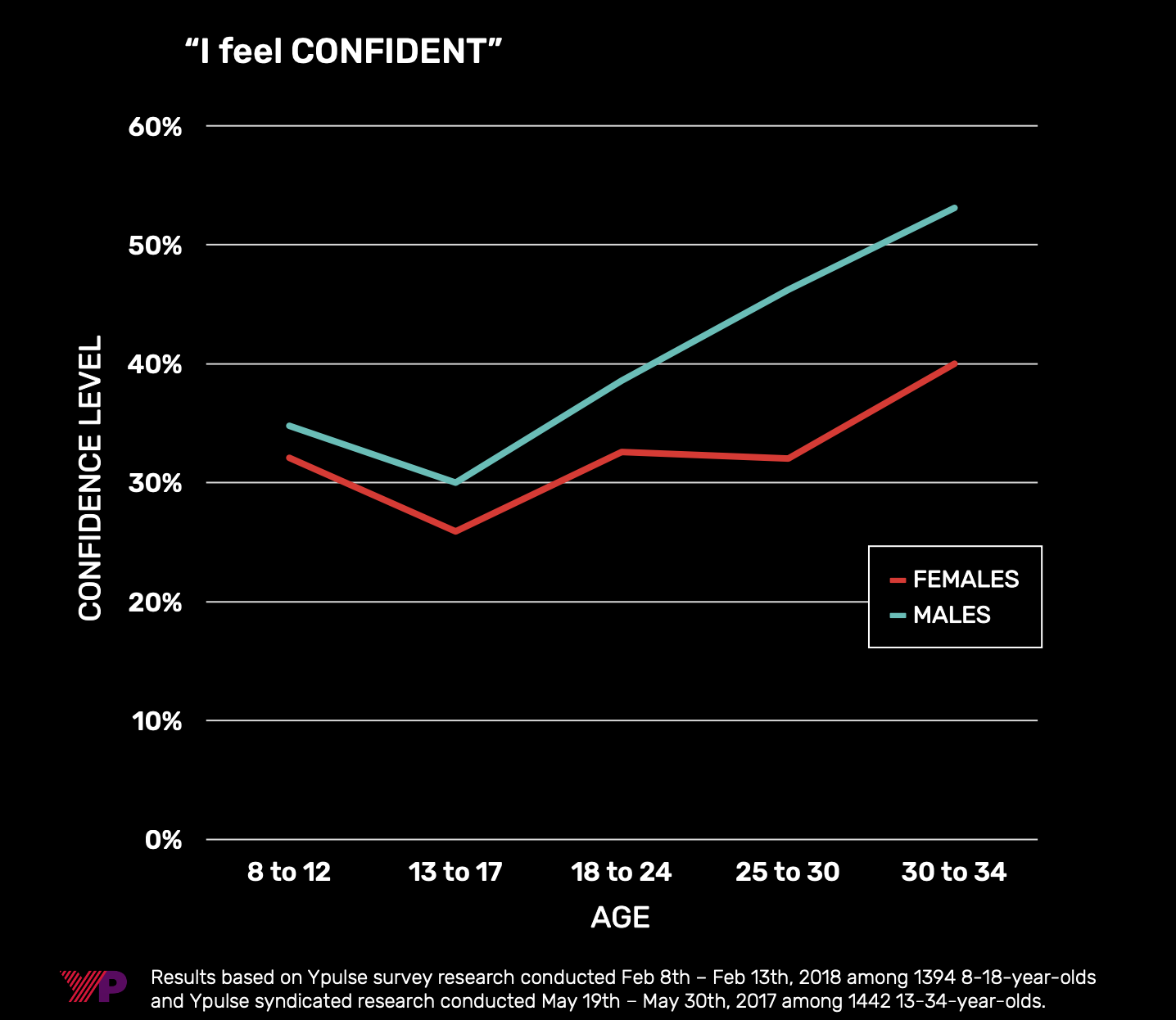A young woman came up to me after my speech to explain how perfectionism was paralyzing her in college. Did I have any advice for her? She said, “It was bad in high school, but it was never THIS bad.” In fact, she said with sadness, her confidence is now worse in college than it has ever been.
The data proves she is not an anomaly. Girls’ leadership organizations and experts have been seeing this worrying trend on the ground for some time: Girls working so hard, often starting in middle school, to attain what everyone says is the gold star of life - college admission - are seeing their confidence stagnate and even plummet right as their collegiate years begin.
How can this data be correct? Girls are succeeding like never before. Female students, by and large, are outperforming males at every level of education. “Girls, as a group, tend to have higher grades, take more advanced classes, graduate high school at higher rates, and participate in higher education, both undergraduate and graduate school, at higher rates.” Indeed, some 70% of high school valedictorians are female.
Isn’t this what we need to close the leadership gap?
Well, maybe not.
One of the ways girls are getting these incredible results is by being incredible perfectionists; overworking and over-preparing, so there is no risk of failure. This seems like an excellent strategy and works great when girls are younger. However, what starts as strong executive function skills can have a surprisingly negative impact on our psyche when we apply this to Every. Single. Thing. we do in life.
I’m a big fan of over-preparing or being diligent in work if we are trying for something we a) are struggling with or b) care about. This is healthy internal striving and can get you far.
However, perfectionism applied to everything and all by itself is outwardly motivated. It’s often worn with distinction to protect us from other people’s perceptions and judgments.
It’s like the Wizard in The Wizard of Oz when Toto tugs the curtain away. He’s exposed for the average person he is, and he panics, yelling, “Never mind that man behind the curtain!”
The pressure to succeed we feel from our culture and schools combined with the girl culture of wanting always to be liked and applauded (outwardly motivated) creates a perfect storm. Add on top the pressure to claim a coveted and more elusive spot at a university of choice, and you’ve got yourself an entrenched, well-grooved, vicious circle.
For example, my daughter came home, announcing that she wanted to take AP chemistry because all her successful friends were taking it next year. They had told her how important it was to take as many AP classes as possible for college applications. Obviously, she was feeling external pressure.
Author and psychologist, Lisa Damour's article in the New York Times titled, There Is No Extra Credit At Work, feels as though it is addressing my kids specifically.
Parents of boys in Dr. Damour’s practice, like my son, tend to “do just enough to keep the adults off their backs, while their daughters relentlessly grind, determined to leave no room for error.” She goes on to ask, “What if school is a confidence factory for our sons, but only a competence factory for our daughters?”
Damour argues that when a child gets a decent grade while exerting minimal effort, they can see where their talents lie, and this can give them confidence and perspective. And girls desperately need some confidence.
Damour has some tactics for us parents to help our girls mitigate stress, anxiety, and help build back their confidence and self-worth in school.
1. “Parents and teachers can stop praising inefficient overwork, even if it results in good grades.” Damour says that “Gendered approaches to learning set in early, so it’s never too soon to start working against them.” Is your daughter writing a more extended than necessary essay or adding lots of bells and whistles to that poster project? Let her know that efficient use of time is going to be more and more critical as she moves through her school years. She should start practicing this sooner rather than later.
2. “Encourage girls toward a different approach to school — one that’s more focused on economy of effort, rather than how many hours they put in.” Help them study in more efficient ways like taking a practice test first to see where the knowledge gaps are before she studies. My daughter has a friend who feels she needs to spend equal time in every class, even the easy ones!
3. “Challenge girls’ over-the-top tendencies” such as doing extra credit work when she already has a high A average. “Ask if she is truly taken with the subject or if she is looking to store up “insurance points,” as some girls call them.”
4. Finally, Damour says we should tell our girls that it’s normal and healthy to feel some anxiety about school. “Too often, girls are anxious even about being anxious, so they turn to excessive studying for comfort. We can remind them that being a little bit nervous about schoolwork just means that they care about it, which of course they should.”
I decided to use Damour’s advice concerning this AP Chemistry class and push back on what was likely a lot of extra work. I reminded her that she already had a couple of accelerated courses in areas of interest. I also asked her if she loved chemistry and saw this as a field she would like to explore. I had a hunch she would reply “no” (which she did). I looked at her knowingly, and she replied, “yeah, I guess it’s a silly idea.”
The truth is, yes, to get into the highest Ivies you’ll probably need as many AP classes as possible (provided you get all A’s). My daughter is many years away from applying to college and is only just starting to discover her interests. However, she still feels pressure to compare herself to and keep up with others by checking all of some universally agreed-upon list of boxes rather than being strategic about pushing herself in classes where she has a genuine interest. This speaks volumes about this normalized pressure to excel amongst girls.
Another truth is you can, instead, tell a story about who you are and what you are interested in through where you spend your time. Rather than just racking up class after class on someone’s arbitrary list, I’ve seen lots of kids work this approach to great success. This gives you permission to work more efficiently to focus more on what you are interested in.
I don’t want my daughter on that confidence gap chart like the talented but unconfident young woman who came up to me. I’d love for my daughter to leave home saying, “this is who I am and what I’m curious about.” Studies show when you know what you are good at (not studying or taking tests, but genuinely good at), it gives you gobs of confidence in all areas of your life.
We must push our daughters to discover what they are good at when they hardly try because the reality is, before we can close the leadership gap, we need to confront confidence first.
-Laura






